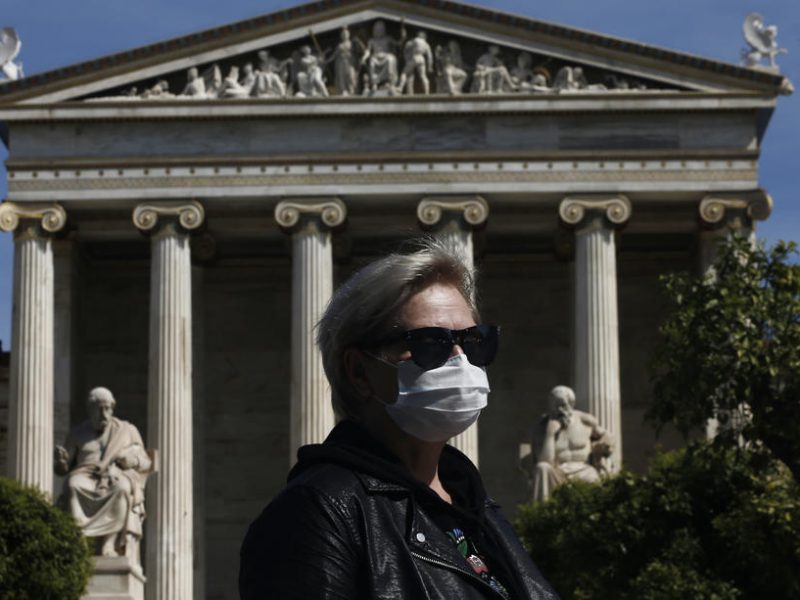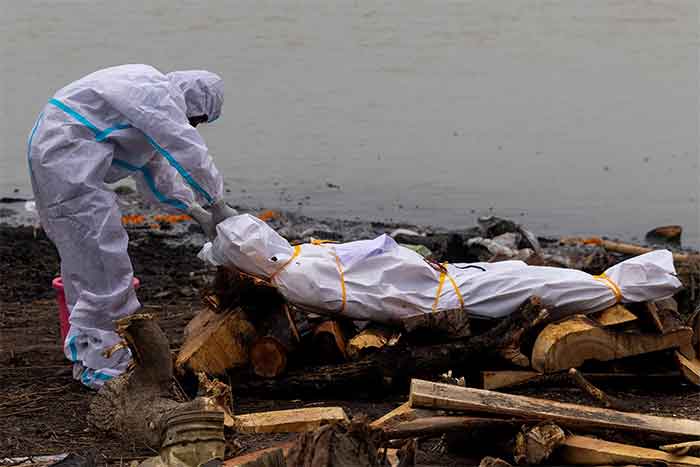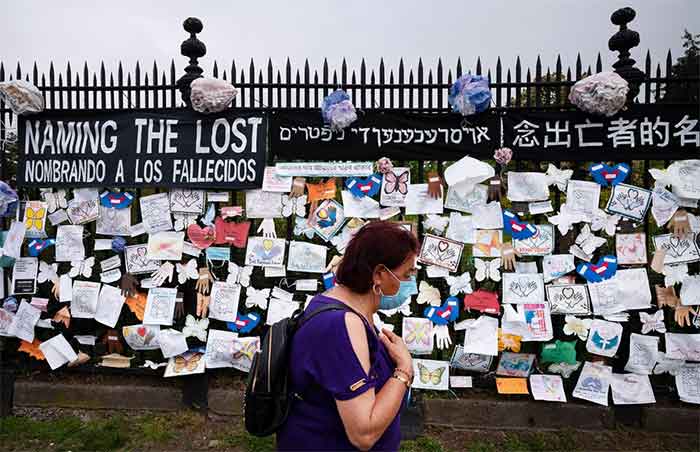
No more kisses, handshakes or blowing out birthday candles. But that’s alright. We can live with these changes.
Many people in Athens are still optimistic. They say that in a relatively short period of time—and aided by more clement weather in the Northern Hemisphere—the global spread of Covid-19 will slow down enough to become manageable. People will joke about new habits like social distancing, which make having fun more problematic. But life will continue flowing in the same rut we are accustomed to in our postmodern world.
Let us begin with the worst-case scenario: Covid-19 becomes a runaway train that kills tens of millions, much the way the Spanish flu did in 1918-20. Yet this virus appears to be less “democratic”—and much more indiscriminate—than that. It is almost Darwinian in the way it tends to spare people under the age of forty. Both the Bubonic plague and the Spanish “lady” had a relatively even death rate distribution among age groups. In other words, if this highly pessimistic projection does come to pass, Covid-19 will skew world demographics and lower the average age in most countries.
It is early days, but like most people in countries affected by Covid-19, Greeks trust what the authorities are instructing them to do to prevent the spread of the virus. This trust, however, has a short expiration date. Just two weeks into the government’s measures, irreverent voices are already audible in the streets of Athens and on the Web. This is quite understandable. Beginning with the 2008 financial crisis, Greeks have suffered a sharper decline in their standard of living—and endured more hardship, pain and grief—than anyone else in the European Union. Complicating matters is the fact that those who are telling people how to behave are precisely those the public holds responsible for the dire straits the country has been in for twelve whole years now. It is almost like having a burglar in your home during an earthquake, who then gives you directions about how to exit the building safely.
With our Mediterranean temperament, we Greeks are not the most disciplined or law-abiding folk. People here are already beginning to complain about measures the center-right government of Kyriakos Mitsotakis is introducing in the name of public health. These include restricting the right of assembly and the phasing out of cash transactions in favor of electronic payments. I have heard complaints about the absence of a government plan to introduce such emergency measures as free healthcare, a moratorium on deportations, evictions and foreclosures, and direct cash aid to working families forced to stay at home without paid sick leave.
Despite all the advances in modern medicine, the Covid-19 pandemic is not socially neutral. As with the Spanish flu, people who live in cramped, lower income areas are more likely to become infected than others. Unlike many of their white collar brethren, blue collar workers do not have the luxury of working from home with Broadband, a laptop and enough money to stockpile food and medicine. If they stay at home, they sink deeper into poverty. At the same time, they do not want to go to work and risk picking up the virus. Many people here are short on cash. They have nothing to do and nowhere to go. So it is realistic to expect a spike in psychological ailments ranging from deep depression to psychopathic behavior.
Unemployment is soon expected to skyrocket everywhere. If the pandemic continues for any extensive period of time, hundreds of companies will be forced into bankruptcy. The colossi will carry out massive cuts and the cost of labor will tank. Capitalists, it seems, are about as clever as this Covid-19 virus. They do not realize that to kill the host is to commit suicide. When too many people are unemployed and commodities cannot be bought, the business cycle does not simply “bottom out”, but it breaks down.
The Great Depression shrank the world’s economy and destroyed international trade and travel. The Covid-19 pandemic is doing the same, only with a colossal difference with the 1930s. It seems we are lucky in our misfortune. This time, a tremendous blow to the world economy will not lead to world war. The atomic bombs dropped over Japan in 1945 made total war impossible. And despite the temporary closure of borders, it is doubtful that there will be a serious and long-term increase in nationalism. Instead, what we are witnessing is an unprecedented rise in mutual help and solidarity among nations and their citizens.
Covid-19 appears to be a man-made calamity. This is important to keep in mind. It does not make it easy for governments to excuse their own incompetence, lack of foresight and preparation for the crisis. Governments cannot blame God or nature for this one. It follows, then, that intense blame games between political opponents will dominate the debate in most countries.
This pandemic is worse than a natural calamity. It is much broader and raw in its impact. Compared with global climate change, it poses a far more intense and immediate problem to humanity. As during a war, people’s lives are abruptly interrupted and families are separated. Unlike war, however, the Covid-19 pandemic is uniting people across all manner of boundaries and borders. The effect it is having is akin to that one might expect from an attack on our planet by extraterrestrials.
Yet solidarity does not last forever. The most extreme example of this truth is WWI. If anything, the Great War united most Russians against the external enemy, Germany and Austro-Hungary – to such a degree that the revolution that was about to erupt in Petrograd was postponed until 1917.
Zombie apocalypse survivalists with bug-out bags and underground shelters chock-full of stockpiled foodstuffs, guns and ammunition, must be feeling pretty smart now. Only they may have been preparing for the wrong crisis entirely. Indeed, if reality sometimes copies art, then of all the movies in recent memory whose plots have some connection to deadly viral epidemics, V for Vendetta may be the one that comes closest to what we may experience once the Covid-19 epidemic subsides.
National governments face an extremely difficult, if not precarious, situation. If they prove to be incapable of guaranteeing the security and livelihood of their citizens, they will fall.
Conspiracy theorists suggest that we are in the antechamber of a neoliberal new world order, a big brother scenario informed by Chinese methods of control. At first blush, the totalitarian measures imposed by Beijing on Wuhan province appear to be bearing fruit. They seem to have contained the spread of the virus (and anything else, for that matter). The fly in the ointment though is that Chinese methods are not the kind Western Europe, the Americas and Africa will easily accept for very long. The Chinese may openly copy many of things from other countries, but the reverse does not hold true.
Intense social unrest and revolution is always preceded by a major show of incompetence on the part of rulers. The French Revolution followed decades of decadence, corruption and costly wars; and the Paris Commune of 1871 came on the heels of the humiliating defeat by the Kaiser’s armies and the capture of the French Emperor. Similarly, the Russian Revolution broke out after the debacle of stillborn democracy in 1905 when Europe’s last autocratic empire suffered a shocking defeat at the hands of the Japanese.
Ironically, gadgets like the Smartphone, which people proudly carry around as symbols of capitalist progress, are actually quite revolutionary. They have made people painfully aware of the gaping difference between what they feel their lives ought to be and what they actually are. In all countries, citizens observe the behavior of their national financial elites, who operate above and beyond the nation and society. And they do not believe the solution to their problems lies in dominating other countries.
Thanks to the digital revolution, there is an unprecedented degree of latent anger among billions of people around the planet. This anger is not directed against other countries and cultures. Instead, it is leveled at their own leaders and the transnational organizations they represent or kowtow before (in Greece that would be the European Union, the International Monetary Fund, and the European Central Bank).
Covid-19 is the first global crisis in history that demands immediate and catholic international cooperation. And the whole world is watching. The pandemic has laid bare the necessity of a fundamental restructuring of society. This is not the first time that a great crisis has shown that human progress, even survival, is inseparable from the struggle against inequality.
People in all countries are hoping the numbers of infected people and deaths do not rise in other countries—even countries that are traditional enemies. Never before, for instance, have medical experts cooperated this intensely across national lines. The Covid-19 crisis has brought out the oneness of our planet.
One thing is certain: the Rubicon has been crossed. In a matter of a few weeks, the world’s collective Weltanschauung has undergone a sea-change. It is quite impossible now for the leaders of the world’s current big players—the United States, China, Russia and the European Union—to return to the status quo ante. Who will acquiesce to the kind of money spent thus far on military might and technology? Covid-19 represents not only a powerful blow to the world’s military-industrial complexes but also to the very urge to conduct politics by “other” means.
This is a crisis that will affect us all in ways we cannot predict. But the socio-economic and political turmoil it unleashes will be extremely transformative.
With rumors circulating in Athens of an impending lockdown, my family and I invited a couple for dinner on March 15th. The man is a fellow teacher at the high school where I work; the woman happens to be the handler of one of Premier Kyriakos Mitsotakis’s top ministers. Annoyingly, she talked on her Smartphone throughout most of the meal. But on two separate occasions, I distinctly overheard her tell her interlocutor that the government might soon have a “revolutionary situation” on its hands.
That may be an overreaction to the frenetic unfolding of events. A few days ago, on the other hand, an estimated 1,000 young people disregarded government instructions and held an antifascist demonstration on the Island of Lesbos, home to the notorious Moria refugee camp.
The Covid-19 pandemic is leading the world into dangerous, uncharted waters. Whatever happens will not be the end of the world. But it will be the end of the world as we know it.
Evel Economakis teachs IB history at Ionios Lyceum in Athens, Greece
SIGN UP FOR COUNTERCURRENTS DAILY NEWS LETTER

















































